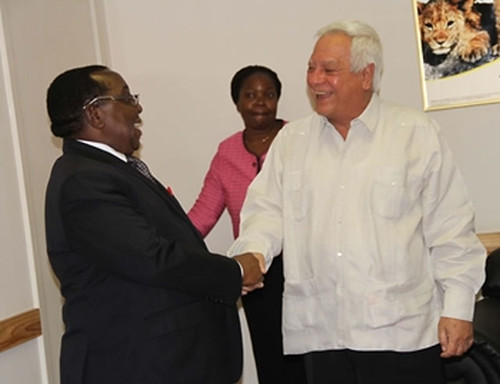
Cuban ambassador to Zimbabwe Enrique Antonio Prieto Lopez bids farewell to official Simon Khaya Moyo on November 5, 2013., a photo by Pan-African News Wire File Photos on Flickr.
‘We must cherish, defend unity’
December 21, 2013 Opinion & Analysis
Lloyd Gumbo The Interview
Zimbabwe Herald
Tomorrow marks the 26th Anniversary of the signing of the Unity Accord between PF-ZAPU and ZANU (PF). How relevant is the agreement today and what are the dynamics shaping the continuance of national unity and cohesion? Our reporter Lloyd Gumbo (LG) talks to ZANU-PF national chairperson Cde Simon Khaya Moyo (SK) about these and other issues.
LG: May you take us through the journey to the agreement and its significance to Zimbabwe today?
SK: Well, first we must understand that the Unity Accord signed by the two great icons of our country, President Robert Mugabe and the late Dr Joshua Nkomo, is the basis of the unity of our people as a whole. It’s not just unity between the two erstwhile parties.
So it’s very significant that when we celebrate this Unity Day, we must take into account the past.
The past tells us that ZANU (PF) and PF-Zapu then, are the two principal liberation movements which brought us freedom. Of course ZANU had its military wing Zanla and ZAPU and its military wing Zipra.
They prosecuted the struggle, these two liberation movements under this, very appreciated leadership. It was a protracted liberation struggle.
When you look back in terms of history, the two parties, although they had split, ZANU had split from ZAPU in 1963, they never lost each other.
LG: How did they not lose each other when they split?
SK: The goals were always the same; freedom and independence of our country which was principally based on the land issue.
The two subscribed to that philosophy that Zimbabwe belonged to Zimbabweans, the black majority and therefore it had to be free.
Past efforts to attain this goal had failed in various forms until the decision of pursuing an armed struggle had to be realised.
So, given that background, it is quite clear that the two parties never lost each other. Efforts were even made in exile that the two liberation armies come together.
This resulted in the formation of ZIPA.
Unfortunately, things did not go the way of our expectation and as we moved on the two liberation armies still had to operate separately.
But the campus was clear that it is the politics which leads the gun and not the gun which leads the politics. Therefore it was vital to strengthen the political unity.
This is what led to the formation of the Patriotic Front. The Patriotic Front was a basis of saying we “must speak with one voice at every forum”. The Patriotic Front’s formation gave us the co-leaders of this organisation, in the name of President Robert Mugabe and the late Dr Joshua Nkomo.
So we had to go to Geneva under the banner of the Patriotic Front for the negotiations. We had to go to Malta as one again under the banner of the Patriotic Front.
We had to go to Lancaster again as one, under the banner of the Patriotic Front. So, this oneness did not just start yesterday. It has been a process of bringing our people together.
As we came to the elections in 1980, although we didn’t move as the Patriotic Front but we still didn’t lose each other either. This is why we have got Patriotic Front still very prominent in ZANU and Patriotic Front still very prominent in ZAPU.
The formation of the Government in 1980 was significant in the sense that it really showed that the Patriotic Front was in charge. We put the seats together and out of the 80 seats which were reserved for blacks, we, as the Patriotic Front combined, got 77 seats and (Bishop Abel) Muzorewa got three.
The other 20 of the 100 seats were reserved for the whites.
But as we moved on in Government, we were proud of it because we viewed it as a Patriotic Front Government. We had to cement this unity through a process, hence we negotiated.
The two parties got into talks until finally we came to an agreement that we both form one organisation — the united ZANU-PF.
You will recall that in the past ZANU-PF was “ZANU” with the “PF” in brackets. But the agreement, we understood it clearly that we must remove the bracket. This is why you see it today, it is Zanu-PF.
We are united in that organisation.
No comments:
Post a Comment